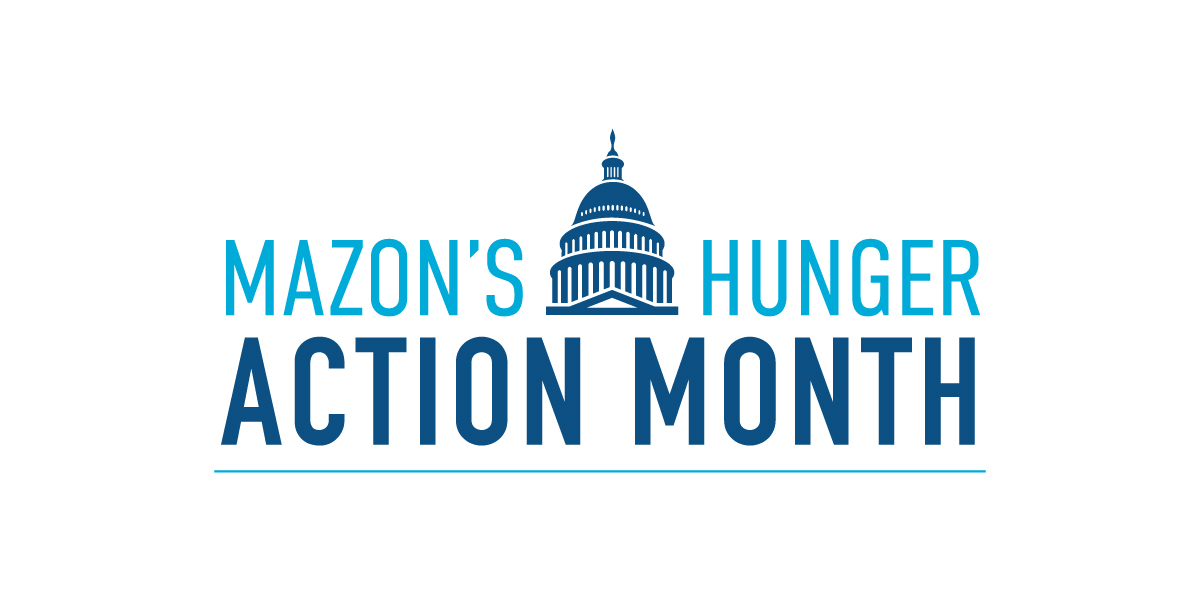
As Jews, we are called to something bigger than individual faith. We are called to live out the morals of our sacred texts in the world around us. This August, join MAZON’s Hunger Action Month to have conversations with lawmakers about a Farm Bill that protects and strengthens our country’s most important nutrition safety net programs. With support and guidance from our policy experts and community organizers, you and your community will have the tools to meet with your representatives in Congress during the August recess when lawmakers return to their districts from Washington, DC.
Why get involved?
The Talmud tells us, “When the community is immersed in suffering, a person may not say: I will go to my home and eat and drink and peace be upon you, my soul” (Taanit 11a). Rather, we’re told “If you see your fellow’s ox or sheep gone astray, do not ignore it; you must take it back to your fellow” (Deuteronomy 22). In modern society, we understand this to mean that we must not look the other way when we see something afflicting our neighbors — we must act.
These core Jewish values begin, well, at the beginning — in Genesis, we are told that all mankind was created b’tselem Elohim, in the image of God. Each and every human has inherent dignity and value.
Taken together, these ideas shape our moral responsibility to help our neighbors and create a just society. They tell us that it’s not enough to acknowledge the suffering — we must actively work to end it. MAZON’s immediate past board chair Rabbi Joel Pitkowsky echoes this compulsion, saying that “when we don’t exercise this ability, then we are at fault.”
At MAZON, we practice and promote advocacy to live out these Jewish values. Hunger exists in every single community, whether or not we can see it. Congressman Jim McGovern calls it “a silent crisis that goes unseen and unnoticed by far too many people, including policymakers in Washington.’” We work with policymakers to ensure the federal nutrition safety net works effectively, efficiently, and reaches all populations in need. When there are nearly 40 million people who struggle with hunger in this country, an institutional response ensures that food reaches those who are hungry today, but also that no one goes hungry tomorrow.
Why now?
The Farm Bill is the largest piece of anti-hunger legislation that provides funding for federal nutrition programs like the Supplemental Nutrition Assistance Program (SNAP). Many of our fellow congregants, neighbors, and community members rely on these lifesaving benefits. Nutrition support helps families put food on the table, ensuring that children can focus on being children rather than worry about their next meal. For seniors on fixed incomes, SNAP is the difference between a healthy diet and chronic malnutrition and diet related diseases. For low-income workers, it offers essential support, allowing them to stretch their budgets amid inflation and stagnating wages and avoid the heart-wrenching choice between buying groceries and paying for rent or medicine. SNAP must be permitted to grow and accommodate all who are in need.
As part of MAZON’s mission, we work to ensure that not only are we acting on these issues, but also that our Jewish community networks realize their political power. Our policymakers are elected to represent their constituents in Congress — they must be held accountable for their action (or inaction) to protect and strengthen our food security programs, and synagogues are powerful agents for this message.
Members of Congress from all sides of the aisle, especially those who are on the fence, need to hear from us. They need to hear from you! They must understand the real-life impact these decisions have on their constituents.
Our country must pass a Farm Bill that meaningfully alleviates hunger across our nation, addressing the needs of those facing food insecurity rather than undermining, defunding, or weakening them.
There are many more fights — Talmudic oxen and sheep — coming down the road. We can’t ignore them, but we also can’t bring them back on our own. It takes our communal voice, our communal power, to ease the pain afflicting our neighbors. Together, we can make a difference and ensure that our nation’s policies reflect our values of compassion, justice, and dignity for all. Please join us in these efforts. Learn more and sign up here.
